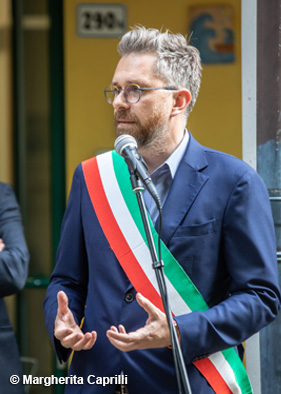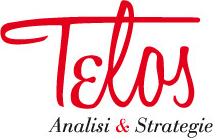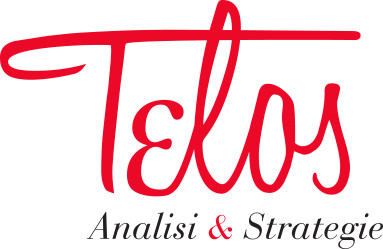June 2022, Year XIV, no. 6
Matteo Lepore
The Mayor of Nòstar Bulàgna
“In this respect, Bologna is a unique city, where you breathe politics, and I’m not just talking about party membership, which has actually even dipped here in recent years. Instead, I’m talking about citizens caring about the common good, about public affairs.”
Telos: Every time someone talks about the direct election of the Prime Minister, people use the very evocative expression “Mayor of Italy”. So, is it true that Mayors have, in the administration of their own city, more power than the Prime Minister has today?
Matteo Lepore: Sure, this is certainly an evocative expression, but I don’t think we can safely say that Mayors have more power than the Prime Minister. Certanly we have a different, more direct relationship with citizens that doesn’t just depend on the electoral system but on the specific nature of Cities, which are proximal institutions.
Of course, Mayors have a lot of direct responsibility, even from a legal standpoint, and must provide a broader response to what is going on in their local areas, sometimes even above and beyond their specific competences as set out by law. This is because they serve as points of reference within the community.
That said, I don’t think you can really compare the powers these two institutional figures have. This reflection on the current state of our institutional architecture isn’t trivial, and shouldn’t be reduced to a slogan, although slogans can be effective because they refer to a model everyone can related to.
The breakdown in the party system has very likely been the source of people’s widespread anti-political sentiment. And yet this gap between citizens and politics is not nearly as wide when it comes to the Mayor. Are your citizens still passionate about politics?
Political parties need to fully recover their role in society, because without the parties, politics is just ruled by interests. They may be flawed but, in the history of our Country, political parties have enabled – and still do to some extent, at least when it comes to a well-established party like the Democratic Party – lots of people from all different walks of life and with different paths and experiences to get actively involved in political life. When they don’t exist or are too fragile, politics becomes something reserved only for the few.
In this respect, Bologna is a unique city, where you breathe politics, and I’m not just talking about party membership, which has actually even dipped here in recent years, although not as much as the rest of the Country. Instead, I’m talking about citizens caring about the common good, about public affairs.
Bologna is a city where there are hundreds of committees and associations that take part in the public debate. They are essential players in the democratic process, worlds that the administration is constantly dialoguing and collaborating with. I think our city is unique in this respect, and my administration is investing heavily in this by increasing the number of initiatives and opportunities for co-planning and collaboration pacts.
If I look at this, I would say yes, the citizens of Bologna are still very passionate about politics. I see this same level of commitment in the Democratic Party at this stage, where thanks to the efforts of secretary Enrico Letta, interesting forums for dialog and sharing are opening up.
So, I’d say that despite the problems and the need to rethink models of political organisation and involvement, what we need is to build trust so the parties can once again offer citizens a space where they can get involved in public life, rather than marking the end of this.
This is your first term as the Mayor of Bologna. In your electoral programme, what is the most complex project to carry out?
The most complex future challenge is certainly linked to the National Recovery and Resilience Plan. Cities are being asked to make a huge effort to do things in five years that, in some cases, they haven’t even been able to do in thirty years.
Large-scale infrastructure specifically comes to mind. This is why I often stress how important it is that the economic resources for investment be accompanied by shared government commitment in order to create the conditions to face this challenge with qualified staff and resources for services and current costs.
In Bologna we are planning to use a considerable part of these funds to sponsor two transformative flagship projects: The City of Knowledge and the Ecological Footprint.
The City of Knowledge is a project to invest in the city’s deepest vocation that best addresses the future of Bologna, home to the oldest university in the world. The project involves the metropolitan area and reinforces an ongoing trend to create and strengthen research centres and poles for data processing, centres like Tecnopolo, for example.
There are two main intervention levers. First: to connect the various city policies in order create a collaborative ecosystem to develop ideas and initiatives among the different players in the areas of research, education, culture and sustainable economic development in the city, a Metropolitan network of Knowledge, essentially.
The second lever, which we call the Knowledge Road, is an urban planning project to regenerate the city’s north-west quadrant, where the physical heart of the City of Knowledge will be located. In fact, this is where important research and innovation poles like Tecnopolo and the National Research Centre will be concentrated. But that’s not all.
Along the Knowledge Road, there are areas we plan to invest in over the coming years through urban and cultural regeneration projects. From abandoned railway infrastructure like the Ravone railway to the Parco del Dopolavoro Ferroviario, which will become important socio-cultural areas, and the Democratic Memory Pole, a centre to research and study critical thought which will house the most important contemporary history archive in Italy.
“I’ll be a Mayor close to the people with an office that will move from one neighbourhood to another”. How are you implementing this intention?
As a kid, I grew up around giant basketball players. My father was a basketball coach and I would travel with him every weekend for their games. That’s how I learned to look at the world through other people’s eyes, to listen and reflect, and value the diversity of each individual.
This is an important lesson that I still carry with me today in my political and administrative career. This is also what inspired the idea of creating the office of the neighbourhood mayor. At the beginning of my term, I decided to station my office in each of the six neighbourhoods in the city for one week a month.
I’ll continue to do this until the end of my term. My staff, including city ministers and technical staff, all move with me. This way, along with the big strategic plans, we work together in proximity, try to understand the point of view of the citizens who live in that specific neighbourhood, what their most pressing everyday problems are.
We also talk about more immediate concerns like dangerous streets that need new street signs or green areas that need better care, and more complex issues like social inclusion, municipal housing interventions and safety. Bologna’s mission is to maintain a strategic vision for innovation and development and the needs of the vulnerable.
Marco Sonsini
Editorial
Mayors have no doubt been some of the most extraordinary guests of PRIMOPIANOSCALAc, and if we haven’t been able to do without them, there surely must be a reason. The first one being that they always provide fantastic answers to our questions that are concrete and full of life experience. Our guest for the June edition is no exception.
We’re talking about Matteo Lepore, Mayor of Bologna and of the Metropolitan City of Bologna since 2021. However, one thing distinguishes him from the usual suspect young politician characterized, at least according to what most people say, by being bold and aggressive. Lepore is timid, a kind sort of timid. “Being timid has really helped me. I owe a lot to it” he says, because it has taught him to listen and learn first, then talk.
An alien has landed in Bologna! Though he’s not a total alien. He abandoned his timid nature right when he got into politics, at the age of 17. At that time, all he was interested in were basketball, music and literature. Till one day, by pure chance, his teammates dragged him to a meeting of the Youth Left.
What was the topic? Foreign policy. According to Lepore: “At a certain point, I raised my hand, asked to take the floor, they said okay, and I started talking. A few weeks later I was a candidate for my neighbourhood, Savena.” You heard it right, the left. Lepore has never been afraid of using this word that now seems almost palaeolithic, and he hasn’t abandoned it since. Another word that now seems rather antiquated is politics. And Lepore isn’t afraid of using the P-word either.
This is how he describes the city he loves, where he served as a city minister for 10 years and where he wants to build an even brighter future: “In this respect, Bologna is a unique city, where you breathe politics, and I’m not just talking about party membership, which has actually even dipped here in recent years, although not as much as the rest of the Country. Instead, I’m talking about citizens caring about the common good, about public affairs.”
In fact, in Bologna the figure of the “active citizen” needs no explanation because it’s in the city’s DNA. This is why he decided to create an itinerant office that moves to a different city neighbourhood each week. And he doesn’t go alone, he brings the other city ministers and the city officials along with him.
In the interview, he explains why: “This way, along with the big strategic plans, we work together in proximity and try to understand the point of view of the citizens who live in that specific neighbourhood, what their most pressing everyday problems are.”
Dear Mayor, we’ll be waiting for you in our neighbourhood! Don’t be tempted by the national political stage and the citizens of nòstar Bulàgna [our Bologna in local dialect] are sure he won’t, but they demand a lot from those who, like Lepore, have been studying to be Mayor for years.
The cover of this issue PRIMOPIANOSCALAc features the Mayor of Bologna with its usual pop flair. It shows the face of our guest with some of the distinctive features of his work, role and life arranged around his head like a sort of hat, a collage where all these different symbols are jumbled together, without any additional elaboration.
And in the case of Matteo Lepore, we had lots of things to choose from because his intense life is full of interests and passions. First of all, there is his “turrita”: Bologna, the city of over 150 towers. Then we have added Bologna’s traditional lunchmeat mortadella, his Alma Mater the University of Bologna, a suitcase representing his diplomatic studies and his dream of travelling the world, a LA Lakers basketball player, a sewing machine for his grandmother who would chat and pedal… or pedal and chat? Plus, Calvino, Ulysses, Gramsci and lots more. And finally, a collage within a collage: the covers of the discs by his favourite group, Radiohead!
Mariella Palazzolo

Matteo Lepore has been the Mayor of Bologna and the Metropolitan City of Bologna since October 2021. His election set a new record when he managed to scoop up 61.9% of the votes, the highest of any candidate in the first round since the direct mayoral elections were instituted. His political career began in 1999, when he became a member of the Democrats of the Left, before joining the Democratic Party in its founding year (2007). In the 2011 administrative elections, he was elected to the Bologna city council and served as the City Minister for Institutional Affairs, Demographic Services, International Relations, Communications, City Marketing, Innovation and Labour. In the subsequent administrative elections in 2016, he was re-elected to the City Council, re-enters the Executive Committee, as the City Minister for Culture, Tourism, Cultural Heritage, Sports and Civic Imagination.
In 2021 he won the centre-left primaries and, that same year, was elected Mayor with a coalition made up of centre-left parties, civic lists and the Five Star Movement.
He has a Degree in Political Science from the University of Bologna as well as several Master’s Degrees, which he also earned abroad: in 2007 in International Relations, in 2008 in Construction and Urban Planning and in 2009 in the Economics of Cooperation.
He shared this childhood memory: “I learned about the world during thousands of kilometres of bus travel with my dad who, when I was a kid, coached a basketball team and took me with him when they would travel on the weekend. I would sit in the back seats, between these giants who were at least 1.90 meters tall with a size 48 shoe. They would talk, joke, laugh and I would sit there listening, fascinated, until I fell asleep with my head in my plate at some roadside pizzeria.”
Lepore was born in Bologna 42 years ago and he is married to Margherita. They have two children, Irma, four years old, and Orlando, who is almost two.
Marco Sonsini







SocialTelos